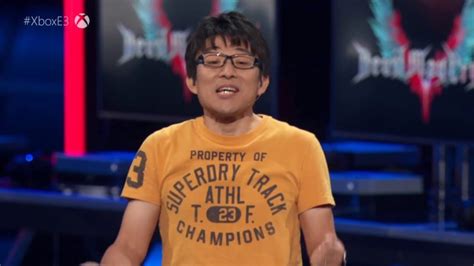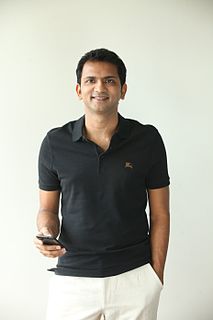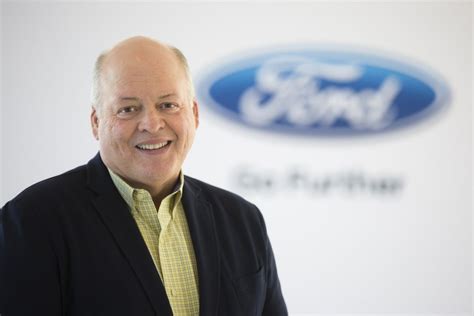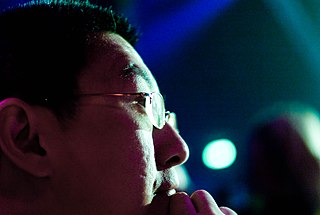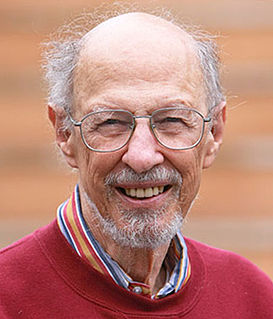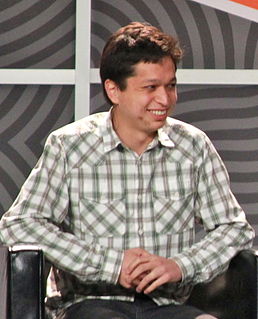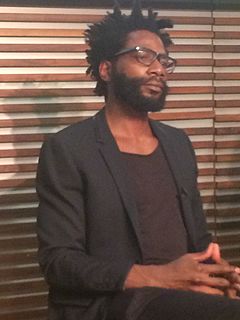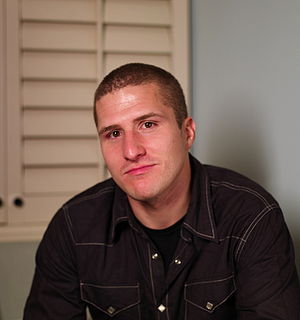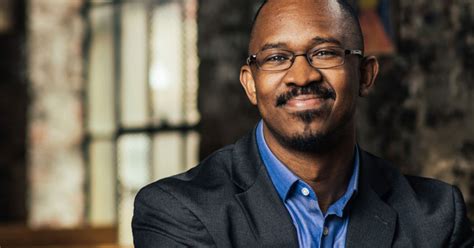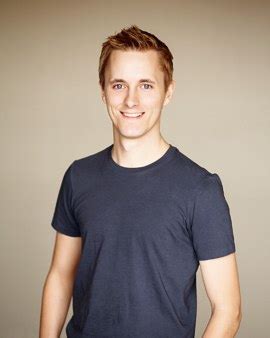Top 586 User Quotes & Sayings - Page 10
Explore popular User quotes.
Last updated on December 22, 2024.
Own one idea. Complete it. Map the current model of purchase and usage. Change how it is done so at least some part of the market uses only your product. Extend from that core user to a much broader universe. Describe your concept in a very short, "six-word story" - a la Ernest Hemingway: "For sale: baby shoes, never worn."
I'm addicted to the Internet. I admit it. It has transformed the way I work as a senator, communicate with my children, and keep tabs on news and cultural developments.... The Internet is a more direct communications link between legislators and their constituents....I constantly work at fusing my Senate work into my office home page to make it as useful, timely, and user-friendly as possible for Vermonters and others who may visit.....I look at my Web site, as my 24-hour virtual office, where visitors can send me an e-mail or search for the information they need anytime, day or night.
I have a cell phone that doesn't behave like a phone: It behaves like a computer that makes calls. Computers are becoming an integral part of daily life. And if people don't start designing them to be more user-friendly, then an even larger part of the population is going to be left out of even more stuff.
Junk turns the user into a plant. Plants do not feel pain since pain has no function in a stationary organism. Junk is a pain killer. A plant has no libido in the human or animal sense. Junk replaces the sex drive. Seeding is the sex of the plant and the function of opium is to delay seeding. Perhaps the intense discomfort of withdrawal is the transition from plant back to animal, from a painless, sexless, timeless state back to sex and pain and time, from death back to life.
Dreams, dreams. I walk them; I live them. I delude myself with them. It's a wonder I can spot reality anymore."... He turned from me with a sigh. "I need a drink."... "Oh, good. That'll fix everything. I'm glad in a world gone mad, you've still got your old standbys."... "What do you expect me to do?" he asked. "You could... You could... Well, now that you're here, you could help us. Plus, this guy we're meeting. He's another spirit user."... "Yeah, that's exactly what I want. To help my girlfriend get her old boyfriend back. " He turned away again, and I heard him mutter, "I need two drinks."
Start by putting yourself in your users' shoes. Why are they coming to your site? If you look at most Web sites, you'd presume that the answer is "User is extremely bored and wishes to stare at a blank screen for several minutes while a flashing icon loads, then stare at the flashing icon for a few more minutes."
I am firmly of the opinion that the Macintosh is Catholic and that DOS is Protestant. Indeed, the Macintosh is counterreformist and has been influenced by the methodical path of the Jesuits.... It is catechistic: the essence of revelation is dealt with via simple formulae and sumptuous icons. Everyone has a right to salvation. DOS is Protestant, or even Calvinistic. It allows free interpretation of scripture, demands difficult personal decisions, imposes a subtle hermeneutics upon the user, and takes for granted the idea that all can reach salvation.
If car manufacturers made cars according to spec the same way software vendors make software according to spec, all five wheels would be of widely differing sizes, it would take one person to steer and another to work the pedals and yet another to operate the user-friendly menu-driven dashboard, and if it would not drive straight ahead without a lot of effort, civil engineers would respond by building spiraling roads around each city.
Have things to look forward to: Plan a trip, treat yourself to the spa, make plans in the future so that you can focus on what you're looking forward to versus how unbearable your present is. Understand that your brain is detaching. It's the same part of the brain that is activated as a cocaine user feening for their next fix. You're literally in withdrawal. Understand that it takes time for your brain and neural pathways to detach. You're not going crazy - it's just a process, and that process takes time.
The way I see it, the difference between farmers and suburbanites is the difference in the way we feel about dirt. To them, the earth is something to be respected and preserved, but dirt gets no respect. A farmer likes dirt. Suburbanites like to get rid of it. Dirt is the working layer of earth, and dealing with dirt is as much a part of farm life as dealing with manure. Neither is user-friendly but both are necessary.
Each of us plays four roles in relation to the brain. We lead, we inspire, we invent, and we use it. Most people do not actively use their brains. They passively let their feelings and thoughts control their lives. They don't invent new ways to use their brains, either, settling instead for the same routine and repetitive thoughts every day. But if you master all four roles, you create your super brain. When you are the active observer of your feelings and thoughts, you become the user of your brain. Your super brain then serves you, not vice versa.
Too many companies believe that all they must do is provide a 'neat' technology or some 'cool' product or, sometimes, just good, solid engineering. Nope. All of those are desirable (and solid engineering is a must), but there is much more to a successful product than that: understanding how the product is to be used, design, engineering, positioning, marketing, branding-all matter. It requires designing the Total User Experience.
A book is a human-powered film projector (complete with feature film) that advances at a speed fully customized to the viewer's mood or fancy. This rare harmony between object and user arises from the minimal skills required to manipulate a bound sequence of pages. Each piece of paper embodies a corresponding instant of time which remains frozen until liberated by the
act of turning a page.
We humans have indeed always been adept at dovetailing our minds and skills to the shape of our current tools and aids. But when those tools and aids start dovetailing back - when our technologies actively, automatically, and continually tailor themselves to us, just as we do to them - then the line between tool and user becomes flimsy indeed.
The selection of MediLab came after an extensive evaluation process. The laboratory in Zambia presented many challenges such as rapidly expanding services and capacity, the need to coordinate laboratory services for 16 and soon to be 24 clinics in the Lusaka district alone, the need to automate recording and dissemination of results and the need for a robust, expandable, user friendly and technically supported LIMS system. The technology and international experience of MediSolution made MediLab an obvious choice.
The economy is still substantially that of the fur trade, still based on the same general kinds of commercial items: technology, weapons, ornaments, novelties, and drugs. The one great difference is that by now the revolution has deprived the mass of consumers of any independent access to the staples of life: clothing, shelter, food, even water. Air access remains the only necessity that the average user can still get for himself, and the revolution has imposed a heavy tax on that by way of pollution. Commercial conquest is far more thorough and final than military defeat.
If you have a strong business idea, then it is comparatively easy now to get capital. It is a positive thing that increasingly more people want to join the startup bandwagon. However, to build a successful business, focus on creating more value through the product, and direct your efforts on solving real issues. If you manage to build a sustainable product, revenue will follow. A lot of startups fail because they concentrate on incremental innovations, increasing user base, and monetisation before strengthening the core of their business.
I have always been spurred on by my not finding expressed anywhere the kinds of perspectives that I thought these issues most perspicuously needed and deserved; but that is just another way of saying that Americans have overwhelmingly expunged from their public understanding the strongest and most clarifying resources out of ancient and traditional European cultures. By far we prefer our familiar and user-friendly parochialisms, and there is no percentage in trying to pry these pachydermal plates apart.
This is the same problem I have with digital photography. The potential is always remarkable. But the medium never settles. Each year there is a better camera to buy and new software to download. The user never has time to become comfortable with the tool. Consequently too much of the work is merely about the technology. The HDR and QTVR fads are good examples. Instead of focusing on the subject, users obsess over RAW conversion, Photoshop plug-ins, and on and on. For good work to develop the technology needs to become as stable and functional as a typewriter.
The internet has no government, no constitution, no laws, no rights, no police, no courts. Don't talk about fairness or innocence, and don't talk about what should be done. Instead, talk about what is being done and what will be done by the amorphous unreachable undefinable blob called the internet user base.
Good design allows things to operate more efficiently, smoothly, and comfortably for the user. That's the real source of advantage. Businesses have started to understand this, so good design will become the price of entry. ... Customers appreciate good design. While they can't necessarily point out what specifically makes it good, they know it feels better. There's a visceral connection. They are willing to pay for it, if you give them a great experience.
Youku Tudou is a hybrid, like combining Netflix and YouTube. Like Netflix, with Youku, which launched in 2005, we syndicate a library of longform content and create original content. The Tudou model started with user-generated content but is increasingly becoming about partner-generated programming.
One is faced with a dilemma: If one places total trust in all other users, one is vulnerable to the antisocial behavior of any malicious user consider the case of viruses. But if one tries to be totally reclusive and isolated, one is not only bored, but one's information universe will cease to grow and be enhanced by interaction with others. The result is that most of us operate in a complicated trade-off zone with various arrangements of trust and security mechanisms.
We have always tried to concentrate on the long term, and to place bets on technology we believe will have a significant impact over time. It's hard to imagine now, but when we started Google most people thought search was a solved problem and that there was no money to be made apart from some banner advertising. We felt the exact opposite: that search quality was very poor, and that awesome user experiences would clearly make money.
For the average home-user, anti-virus software is a must. A personal firewall such as Zone Alarm and running a program like HFNetcheck, which is a free download for personal users. It checks your system to see if anything needs to be patched. I'd also recommend a program such as SpyCop to periodically check for any spyware on your system.
Developing fewer features allows you to conserve development resources and spend more time refining those features that users really need. Fewer features mean fewer things to confuse users, less risk of user errors, less description and documentation, and therefore simpler Help content. Removing any one feature automatically increases the usability of the remaining ones.
Treatment is not now available for almost half of those who would benefit from it. Yet we are willing to build more and more jails in which to isolate drug users even though at one-seventh the cost of building and maintaining jail space and pursuing, detaining, and prosecuting the drug user, we could subsidize commensurately effective medical care and psychological treatment.
Steve Jobs did not start started Apple as a scam. But he understood early on the power of marketing. The idea of the computer as a bicycle for the human mind - I think that was something he believed. He believed in making people comfortable with these machines, which is why he spent so much time thinking about how to design them a certain way, how to make them so user-friendly and interactive, and why he spent so much time studying the Zeitgeist.
Through panel moderations and talks around culture, politics and identity I gradually gained opportunities to write in my own voice and not that of the brand. I'm interested in a lot of the languages that drive our culture. I'm interested in user experience as language or how societal malaise takes root. So through essays and short stories I began exploring some of these things.
In the early days, a Georgia college kid named Chris Putnam created a virus that made your Facebook profile resemble MySpace, then the social-media incumbent. It went rampant and started deleting user data as well. Instead of siccing the F.B.I. dogs on Putnam, Facebook co-founder Dustin Moskovitz invited him for an interview and offered him a job.
She was a keen observer, a precise user of language, sharp-tongued and funny. She could stir your emotions. Yes, really, that's what she was so good at - stirring people's emotions, moving you. And she knew she had this power...I only realized later. At the time, I had no idea what she was doing to me.
To the designer, great design is beautiful design. A significant amount of effort must be placed into making the product attractive. To the client, great design is effective. It must bring in customers and meet the goals put forth to the designer in the original brief. To the user, great design is functional. It’s easy to read, easy to use and easy to get out of it what was promised Truly great design, then, is when these three perspectives are considered and implemented equally to create a final product that is beautiful, effective and functional.
The pace of change for entrepreneurs is rapidly accelerating, and the cost and risk of launching a new business and getting off the ground is just amazing. The ability to gain user feedback really quickly and adapt to what your consumers want is totally different with the web as it is now. But finding a new market, helping people and taking that original idea and turning it into a business is really exciting right now.
AI works really well when you couple AI in a raisin bread model. AI is the raisins, but you wrap it in a good user interface and product design, and that's the bread. If you think about raisin bread, it's not raisin bread without the raisins. Right? Then it's just bread, but it's also not raisin bread without the bread. Then it's just raisins.
Writing about the indignities of old age: the daunting stairway to the restaurant restroom, the benefits of a wheelchair in airports and its disadvantages at cocktail parties, giving the user what he described as a child's-eye view of the party and a crotch-level view of the guests. Dying is a matter of slapstick and pratfalls. The aging process is not gradual or gentle. It rushes up, pushes you over and runs off laughing. No one should grow old who isn't ready to appear ridiculous.
The methods that will most effectively minimize the ability of intruders to compromise information security are comprehensive user training and education. Enacting policies and procedures simply won't suffice. Even with oversight the policies and procedures may not be effective: my access to Motorola, Nokia, ATT, Sun depended upon the willingness of people to bypass policies and procedures that were in place for years before I compromised them successfully.
If the universe is a non-spatial computer, a 'time machine' is a program that allows a user to have the same (ontologically non-spatial) feelings or experiences that occurred or s/he merely feels to have occurred in the past, with an in-built function to have different feelings or experiences than those of the past, and thus creating a possibility to change the past or to rewrite history in a pseudo sense.









